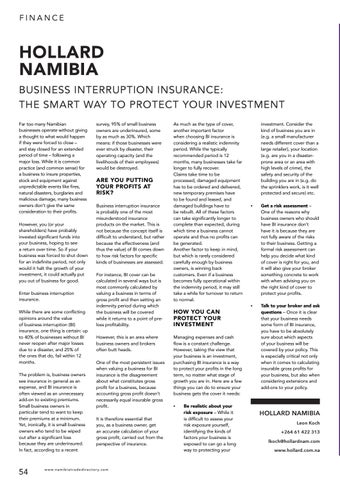FINANCE
HOLLARD NAMIBIA
BUSINESS INTERRUPTION INSURANCE: THE SMART WAY TO PROTECT YOUR INVESTMENT Far too many Namibian businesses operate without giving a thought to what would happen if they were forced to close – and stay closed for an extended period of time – following a major loss. While it is common practice (and common sense) for a business to insure properties, stock and equipment against unpredictable events like fires, natural disasters, burglaries and malicious damage, many business owners don’t give the same consideration to their profits. However, you (or your shareholders) have probably invested significant funds into your business, hoping to see a return over time. So if your business was forced to shut down for an indefinite period, not only would it halt the growth of your investment, it could actually put you out of business for good. Enter business interruption insurance. While there are some conflicting opinions around the value of business interruption (BI) insurance, one thing is certain: up to 40% of businesses without BI never reopen after major losses due to a disaster, and 25% of the ones that do, fail within 12 months. The problem is, business owners see insurance in general as an expense, and BI insurance is often viewed as an unnecessary add-on to existing premiums. Small business owners in particular tend to want to keep their premiums at a minimum. Yet, ironically, it is small business owners who tend to be wiped out after a significant loss because they are underinsured. In fact, according to a recent
54
survey, 95% of small business owners are underinsured, some by as much as 30%. Which means: if those businesses were ever struck by disaster, their operating capacity (and the livelihoods of their employees) would be destroyed.
ARE YOU PUTTING YOUR PROFITS AT RISK? Business interruption insurance is probably one of the most misunderstood insurance products on the market. This is not because the concept itself is difficult to understand, but rather because the effectiveness (and thus the value) of BI comes down to how risk factors for specific kinds of businesses are assessed. For instance, BI cover can be calculated in several ways but is most commonly calculated by valuing a business in terms of gross profit and then setting an indemnity period during which the business will be covered while it returns to a point of preloss profitability. However, this is an area where business owners and brokers often butt heads. One of the most persistent issues when valuing a business for BI insurance is the disagreement about what constitutes gross profit for a business, because accounting gross profit doesn’t necessarily equal insurable gross profit. It is therefore essential that you, as a business owner, get an accurate calculation of your gross profit, carried out from the perspective of insurance.
w w w. n a m i b i a t r a d e d i r e c t o r y. c o m
As much as the type of cover, another important factor when choosing BI insurance is considering a realistic indemnity period. While the typically recommended period is 12 months, many businesses take far longer to fully recover. Claims take time to be processed, damaged equipment has to be ordered and delivered, new temporary premises have to be found and leased, and damaged buildings have to be rebuilt. All of these factors can take significantly longer to complete than expected, during which time a business cannot operate and thus no profits can be generated. Another factor to keep in mind, but which is rarely considered carefully enough by business owners, is winning back customers. Even if a business becomes fully operational within the indemnity period, it may still take a while for turnover to return to normal.
HOW YOU CAN PROTECT YOUR INVESTMENT Managing expenses and cash flow is a constant challenge. However, taking the view that your business is an investment, purchasing BI insurance is a way to protect your profits in the long term, no matter what stage of growth you are in. Here are a few things you can do to ensure your business gets the cover it needs: •
Be realistic about your risk exposure – While it is difficult to assess your risk exposure yourself, identifying the kinds of factors your business is exposed to can go a long way to protecting your
investment. Consider the kind of business you are in (e.g. a small manufacturer needs different cover than a large retailer), your location (e.g. are you in a disasterprone area or an area with high levels of crime), the safety and security of the building you are in (e.g. do the sprinklers work, is it well protected and secure) etc. •
Get a risk assessment – One of the reasons why business owners who should have BI insurance don’t have it is because they are not fully aware of the risks to their business. Getting a formal risk assessment can help you decide what kind of cover is right for you, and it will also give your broker something concrete to work with when advising you on the right kind of cover to protect your profits.
•
Talk to your broker and ask questions – Once it is clear that your business needs some form of BI insurance, you have to be absolutely sure about which aspects of your business will be covered by your policy. This is especially critical not only when it comes to calculating insurable gross profits for your business, but also when considering extensions and add-ons to your policy.
HOLLARD NAMIBIA Leon Koch +264 61 422 313 lkoch@hollardnam.com www.hollard.com.na
